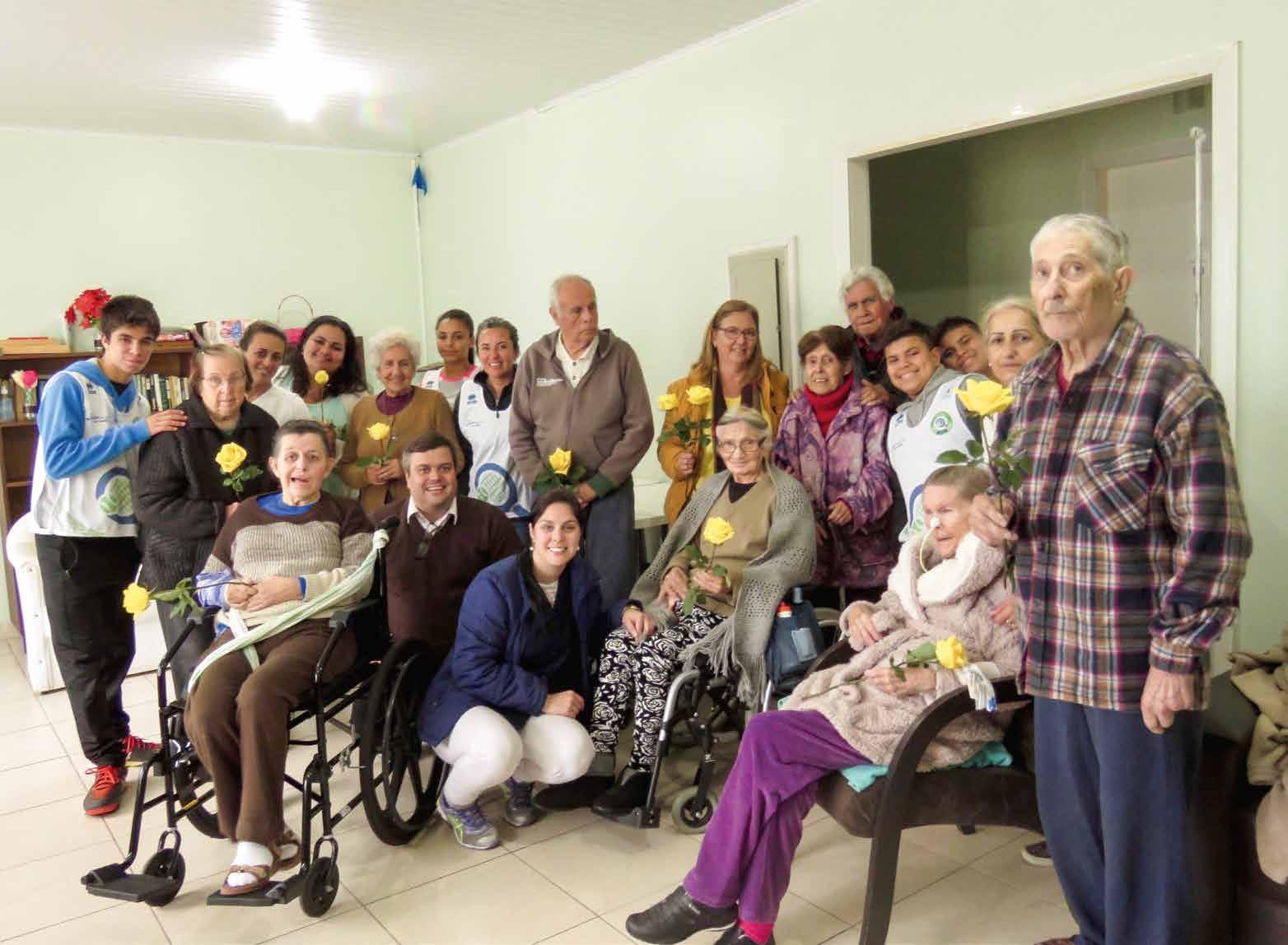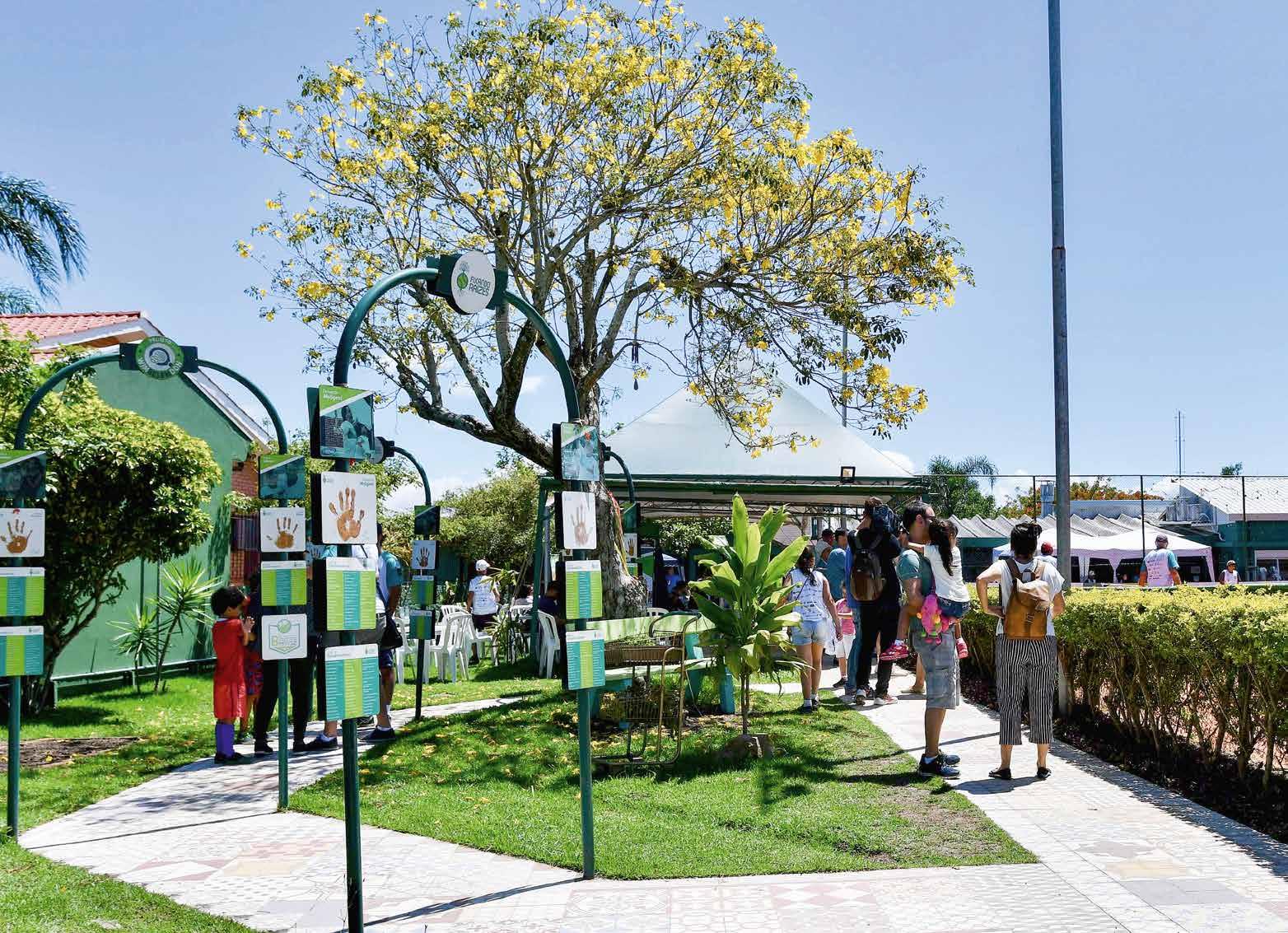
5 minute read
GRATITUDE GRATIDAO
ela seria ainda melhor, com uma cozinha de verdade. Por meio de um termo de ajuste de conduta (TAC) imposto pelo Ministério Público do Trabalho a uma empresa de construção, foram feitos a cozinha industrial e o refeitório, um sonho da família WimBelemDon. A estrutura foi feita com recursos da empresa e o mobiliário, comprado pelo projeto. “Não imaginávamos tudo isso. No primeiro dia de almoço no novo espaço, cada um entrava com uma salva de palmas. As crianças impressionadas, porque parecia um restaurante. Acharam lindo”, lembra Luciane.
O plano político-pedagógico começou a ser colocado em prática com a capacitação da equipe e o início do planejamento conjunto das oficinas. Tênis, oficina de cinema, laboratório de aprendizagens, tudo interligado. A proposta era trabalhar com as crianças integralmente. “A gente já contemplava muito do que traziam os nove pilares do desenvolvimento integral, mas, com uma nova sistematização, tudo começou a fazer muito mais sentido”, aponta Luciane. Junto a isso, o fio condutor do trabalho, os atributos do WimBelemDon – amor, altruísmo, autoaceitação, empatia, generosidade, gentileza, gratidão, honestidade, humildade, perdão, perseverança, respeito e tolerância –, que, além de virar uma marca do projeto, foram devidamente apropriados pelas crianças.
Advertisement
Segundo Luciane, mesmo muito tempo depois de terem trabalhado com determinado atributo, elas o identificavam no seu cotidiano, em casa, na escola, na ONG, em filmes, na oficina de cinema. Uma lembrança muito bonita da fundadora foi uma atividade em que as crianças teriam que criar projetos para trabalhar um atributo e vivenciá-lo fora do WimBelemDon. “Era o Respeito, e um grupo escolheu o Lar dos Velhinhos, próximo daqui. Ao final do projeto, AS CRIANÇAS TIVERAM A IDEIA DE PREMIAR E AGRADECER A TODOS OS IDOSOS COM ROSAS AMARELAS, PORQUE A COR ESTAVA RELACIONADA AO ATRIBUTO DA GRATIDÃO, que elas haviam trabalhado anos antes.” was built by the company and the furniture was purchased by the project. “We couldn’t have imagined any of that. The first time we had lunch in the new space, each person who came in started to clap. The children were impressed because it looked like a restaurant. They thought it was gorgeous”, Luciane recalls. The Politico-Pedagogical Plan was put into practice by hiring the team and collectively planning the workshops. Tennis, film workshops, learning labs, everything interconnected. The proposition was to develop a holistic approach to work with the children. “We had already been doing a lot of what was involved in the nine pillars of integrated development, but with a new system, everything made a lot more sense”, Luciane stresses. Additionally, the main driver of the work, the WimBelemDon personal attributes – love, altruism, self-acceptance, empathy, generosity, gratitude, honesty, humility, forgiveness, perseverance, respect, and tolerance – became a trademark of the project and were duly embraced by the children. According to Luciane, even after a long time has elapsed since they’ve worked with a specific attribute, they will still identify it in their routine at home, at school, at the NGO, in movies they watch at the film workshop. A beautiful memory the founder has was an activity in which the children had to create projects to work with an attribute and experience it outside WimBelemDon. “It was Respect, and one of the groups chose a nearby care home. At the end of the project, THE CHILDREN HAD THE IDEA OF THANKING ALL THE ELDERLY RESIDENTS BY PRESENTING THEM WITH YELLOW ROSES, BECAUSE THAT COLOUR WAS LINKED TO THE ATTRIBUTE OF GRATITUDE, which they had worked with years before.”
For the first time, in 2015, there was a General Assembly of the WimBelemDon educators with the children to talk about the activities and ask for feedback.
EM VISITA AO LAR DOS VELHINHOS PARA TRABALHAR O ATRIBUTO RESPEITO, OS EDUCANDOS RESOLVERAM PRESENTEAR OS MORADORES COM ROSAS AMARELAS, A COR DA GRATIDÃO
VISITING THE CARE HOME TO WORK ON THE PERSONAL ATTRIBUTE OF RESPECT, THE PUPILS GAVE THE RESIDENTS YELLOW ROSES, REPRESENTING GRATITUDE
The Game
INAUGURAÇÃO DO CAMINHO DO ACE SOCIAL, A “CALÇADA
DA FAMA” DO WBD, DURANTE O 70 ROLANDO ARROZ
OFFICIAL OPENING OF THE SOCIAL ACE PATHWAY, THE WBD ‘WALK OF FAME’, DURING THE 7TH ROLANDO ARROZ

Pela primeira vez, em 2015, houve uma assembleia geral dos educadores do WimBelemDon com as crianças, para conversar sobre as atividades e ter sugestões de melhorias.
Na 7a edição do Rolando Arroz, o clima era de comemoração. Pela conquista do terreno e pelo novo embaixador. O tenista Bruno Soares, grande destaque na campanha de crowdfunding, foi oficialmente convidado por Thomaz Koch e Fernando Meligeni para também se tornar embaixador do WimBelemDon. Com a presença dos tenistas Marcos Daniel e André Ghem, foi inaugurado, nesse dia, o “Caminho do Ace Social”, a calçada da fama que reúne as mãos – marcadas no saibro – dos atletas que dedicam atenção especial ao projeto.
Em 2016, o mais do que especial Prêmio da Associação Brasileira de Captadores de Recursos (ABCR), na categoria Organização do Ano. Reconhecimento à excelência e à inovação em captação de recursos para organizações da sociedade civil. Ao mesmo tempo, dificuldades financeiras impediram a entrada de novos educandos no projeto.
Ainda assim, WimBelemDon seguia como referência. O estudante norte-americano Connor Berkebile passou sete semanas no projeto como parte do Programa de Direito Internacional dos Direitos Humanos (PIHRL) da Escola de Direito Robert H. McKinney, da Universidade de Indiana, nos Estados Unidos. A experiência dele foi tão diferenciada que seu orientador, professor George Edwards, resolveu vir ao Brasil e conhecer WimBelemDon com os próprios olhos. Interação gratificante para a equipe e para as crianças.
Uma experiência divertida e diferente trouxe outro personagem para a história do WimBelemDon, o chef paulista Lucas Corazza. Por meio da iniciativa Chocólatras Solidários, ele produziu em torno de 300 doces com a ajuda de educandos do projeto. Tudo foi vendido em menos de três horas e a renda, R$ 4 mil, revertida para a ONG. Essa quantia, somada aos recursos de três doadores anônimos e à doação de materiais pela
At the 7th Rolando Arroz, the atmosphere was of celebration, both because of the purchase of the land and because of the new ambassador. Tennis player Bruno Soares, a highlight in the crowdfunding campaign, was officially invited by Thomaz Koch and Fernando Meligeni to also become a WimBelemDon ambassador. In the presence of tennis players Marcos Daniel and André Ghem, we unveiled on the same day the “Social Ace Pathway”, our walk of fame displaying the handprints – printed on court clay – of the sports personalities that have dedicated special attention to the project.
In 2016, the super special Award from the Brazilian Fundraisers’ Association [ABCR, in the original], under the Organisation of the Year category. A recognition of excellence and innovation in fundraising for civil society organisations. At the same time, financial difficulties stopped the project from accepting new pupils.
Even so, WimBelemDon was still seen as a role model. American student Connor Berkebile spent seven weeks at the project as part of the Program of International Human Rights Law (PIHRL), of the Robert H. McKinney School of Law at Indiana University, in the USA. The experience was so unique that his supervisor, Professor George Edwards, decided to come to Brazil and see WimBelemDon for himself. A highly rewarding interaction for the team and the children. A fun and different experience brought another character into the WimBelemDon story, São Paulo chef Lucas Corazza. Through the Chocólatras Solidários initiative, he made around 300 sweets with the help of our pupils. Everything was sold out in less than three hours, yielding R$ 4,000 of income to the NGO. This amount plus resources from three anonymous donors and a donation of materials from Madeben, a local timber and










